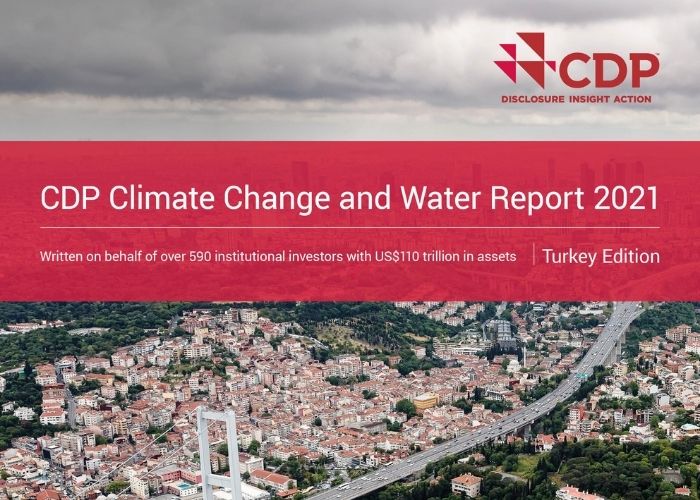
Submitted by selincene on July 5, 2022
CDP Turkey launched the “CDP Turkey Climate Change and Water Report 2021”, which includes the analysis of the data disclosed by companies reporting to investors and other stakeholders through the CDP platform in 2021, at the 12th Climate Change Virtual Conference.
According to the results of the report; the number of companies responding to the CDP Climate Change Program in Turkey increased from 60 in 2020 to 67 in 2021. 41 of these companies received official invitations from investors to report to CDP and were included in Borsa Istanbul's BIST-100 index. The number of BIST 100 companies responding to the CDP has increased for the first time in five years. The remaining 26 companies responded voluntarily. Analyzes included in the report; based on data from a total of 64 companies, excluding 3 sub-companies, included in the reporting scope of a parent company responding to the CDP.
The number of companies responding to the CDP Water program increased from 36 in 2020 to 44 in 2021. In 2021, 33 companies received official invitations, and 11 responded voluntarily. The number of companies included in the report's analysis within the scope of the water program is 41.
Some of the key findings of the CDP Turkey Climate Change and Water Report 2021 regarding climate change analyzes are as follows:
- Board-level oversight of climate-related issues within the organizations is increasing year by year. Companies that include climate-related issues on the agenda at every board meeting have risen from 33% last year to more than half (53%) of all responding companies this year.
- The proportion of risks related to climate change, which directly affects companies’ activities, is increasing every year. The rate, which was 86% in 2018, 90% in 2019, and 94% in 2020, rose to 97% this year, reaching a record level. Now, almost all companies are aware of the risks posed by climate change and are developing prevention mechanisms. In this instance, the full participation of corporate governance in the issue of the climate crisis has created a new business normal.
- This year, among the ten indicators in companies' self-identified risk types considered in the organization's climate-related risk assessments; Emerging Regulation risks (with a rate of 95%), Market risks (with a rate of 97%), and Chronic Physical risks (with a rate of 92%) were at the top of most reported risks. Besides, the ratio of companies that identified these three risk types as relevant to their operation has increased dramatically since last year.
- Among the 18 risk drivers identified with the potential to have a significant financial or strategic impact on companies this year, the number of companies choosing Carbon Pricing Mechanisms increased from 59% to 70%.
- 91% of disclosing companies identified climate-related opportunities that have the potential to have a significant financial or strategic impact on company operations, an increase from 89% in 2020.
- This year, 33% of companies identified climate-related opportunities in upstream activities covering the supply chain. This figure has risen from 17% last year, indicating that adding the residual value chain seems more attractive in identifying climate-related opportunities.
- The number of companies that do not plan to set a Science-Based Target in the next two years is decreasing from year to year. The rate, which was 19% in 2020, has decreased to 11% this year, revealing a promising picture.
Some of the key findings of the CDP Turkey Climate Change and Water Report 2021 regarding water security analyzes are as follows:
- While 41% of responding companies reported that their water consumption decreased from the previous year, 17% reported an increase. Regarding water withdrawals, 49% of responding companies report a decrease, while 22% measured a rise compared to 2020.
- This year, the rate of companies with higher total water consumption, discharge, and withdrawal compared to last year decreased, while the rate of companies with lower total water consumption, discharge, and withdrawal compared to the previous year increased. 66% of responding companies reported that more than half of total withdrawals were sourced from water-stressed areas, which is much higher than the previous year (53%). Most of the water withdrawal is sourced from third-party sources (76%), and most of the water is discharged to third-party destinations (78%), which shows water crosses the company boundary, at either the corporate level or facility level.
- While almost all companies (98%) undertake a water-related risk assessment, only 27% reported that they experienced any detrimental water-related impacts.
- Water-related regulatory frameworks (95%) and water availability at a basin/catchment level (95%) are the most considered contextual issues in the company’s water-related risk assessments. 78% of companies in Turkey conducted a risk assessment with a consideration of river basin management authorities and a further 90% with local communities. Regulators are the most considered stakeholders (98%) in the company’s water-related risk assessments.
- Physical risks are the most reported types of risks in direct operations (68%) and the value chain (49%).
- Looking at the longer term, 85% of respondents in Turkey are integrating water-related issues into the organization's long-term strategic business plan. A further 46% integrated those issues into a strategic business plan for more than 10 years. While 78% of companies considered water-related issues in their financial planning, 78% considered it in their long-term business objectives.
Click here to access the full report.





